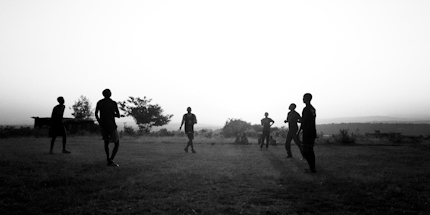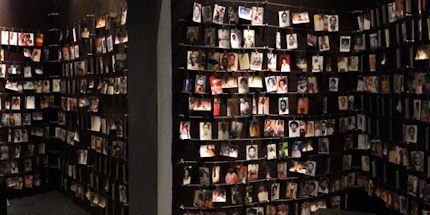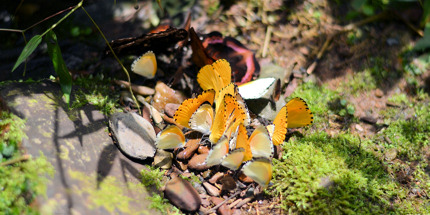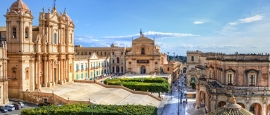Rwanda rediscovered
It's been 20 years since the end of the civil war that rocked Rwanda. But now the country is emerging out of the shadows, and with tourism on the rise, the time is ripe for uncovering what this corner of Africa has to offer.
Think of Rwanda and it’s likely that one thing springs to mind – the 1994 genocide. A haunting feature of the country's civil war, the massacre claimed thousands of lives and left the country broken. But in the two decades since, Rwanda has undergone a remarkable recovery and today it is one of Africa’s most stable and safest countries.
Approximately half the size of Scotland, Rwanda is a stunningly scenic, mountainous little country, packed with incredible wildlife. And now, with the introduction of the East African single tourist visa, which lets tourists visit Kenya, Rwanda and Uganda on one visa, getting to see Africa’s ‘Little Switzerland’ has never been easier.
Tracking gorillas at Volcanoes National Park
There can’t be much that beats tracking Rwanda’s rare and endangered mountain gorillas. It’s a peerless travel experience, easily one of the top wildlife expeditions in Africa.
Rwanda’s gorillas live amongst five verdant volcanoes in the northwest of the country. Trekking through the rainforest and watching them gorge on bamboo is an exhilarating experience, although it can be unnerving when they bound towards you. Close up you realise how large these magnificent primates are: they weigh about three times as much as the average man.
The whole venture can seem scarier than it actually is, but the guides are reassuringly experienced. And their work, coupled with the country's burgeoning tourism industry, is helping preserve Rwanda's mountain gorillas at a time when the rest of the world's primates are in decline.
Only 80 permits to see the gorillas are granted each day and their is heavy demand to see the gorillas, so make enquiries as early as possible. Don’t miss the opportunity to spot the park’s rare golden monkeys too.
Remembering history in Kigali
The small, sleepy capital, Kigali, fans out over a series of lush green hills and valleys. It’s a glorious mix of the smart, contemporary and clean – glistening shopping malls, some striking modern architecture, tranquil tree-lined streets and suited business people – but downtown it descends into a riot of colour and sound, from the market stalls piled high with bright batiks, to a symphony of car horns and eager kids offering to shine your shoes or sell you a newspaper.
 Boys play football in lively downtown Kigali
Boys play football in lively downtown KigaliCreative Commons / Guido van Nispen
This is also where you’ll find memorials and museums dedicated to the genocide, the principal one being the unmissable Genocide Memorial Centre. The large, white, conspicuously modern building, 1km (0.6 miles) north of the city, houses a dedicated museum, and is the burial site of more than 250,000 people killed during the war.
You can't fail to reflect upon the overwhelming scale of the violence as you wander through the carefully tended gardens to the mass graves. One heartbreaking room details the children who perished, including their names, favourite foods and cause of death.
Back in central Kigali is the Hotel des Mille Collines, which became a refugee centre during the genocide and which was made famous by the 2004 film Hotel Rwanda. Now a lush 4-star hotel with swanky rooms and on-site pool, there’s little trace of its dramatic history, apart from a plaque explaining its role in 1994.
Another place worth visiting is the whitewashed State House Museum, home of President Habyarimana, who died when his aeroplane was shot down in 1994. Turned into a museum just last year, it includes displays of Rwandan culture, clothing, jewellery and hairstyles.
A good place to base yourself is the City Blue Hotel in the centre of the city. It’s clean, contemporary and modern, and convenient for exploring Kigali.
 Pictures of victims adorn the walls of Kigali Genocide Memorial Centre
Pictures of victims adorn the walls of Kigali Genocide Memorial CentreCreative Commons / Adam Jones
Exploring primeval forests in Nyungwe
It’s a joy – if a bit hair-raising at times – to travel the road to Nyungwe, passing endless people herding goats, balancing canisters of water or bananas on their heads or an unfeasibly large selection of goods for the market on bicycles.
One of Africa’s last surviving patches of primeval pre-Ice Age rainforests, Nyungwe Forest National Park is Rwanda’s most important area of biodiversity. Located in the southwest and over 1,000 sq km (386 sq miles) in size, visitors head here for its vast array of plant and animal species, including 13 species of primates, which include chimpanzees, colobus monkeys and mangabeys. Nyungwe is, unsurprisingly, the most important ornithological site in Rwanda, with 275 bird species (spotting the Great Blue Turaco is a highlight) and there is an extensive network of walking trails for avid hikers.
Tourism here is being boosted by the Nyungwe Nziza Project, which is harmonising tourism, wildlife, environmental and agrarian development. You can stay in a luxury eco-lodge here and go on a stunning canopy walk, the first of its kind in East Africa, 100m (330ft) above the rainforest. Kazinga Tours and Sunrise Ecotours organise tours to Nyungwe.
 Bright butterflies in Nyungwe forest
Bright butterflies in Nyungwe forestCreative Commons / François Terrier
-------------------------------------------------------------------------------------
Need to know
Getting there: KLM flies from London Heathrow to Kigali via Amsterdam from £548 return.
When to go: Being fairly temperate, Rwanda can be visited at any time of year, though the dry seasons (mid-December to mid-February and mid-May to mid-October) are best. The rainy seasons are best for chimpanzee tracking.
Safety: The country is safe but check official travel advice if planning to travel near the volatile Democratic Republic of Congo and Burundi borders with Rwanda. Check health requirements thoroughly.
Money: Not all ATMs in Kigali accept foreign cards. Many imported goods are very expensive, and East African equivalents are far cheaper.
Ethical travel: Tourism is strictly controlled in Rwanda; a limited number of gorilla permits are issued and environmental management plans are being developed. Choose a tour operator with clear environmental policies which enhance conservation and benefit local people - our writer recommends Primate Safaris.
Do you have any Feedback about this page?
© 2026 Columbus Travel Media Ltd. All rights reserved. No part of this site may be reproduced without our written permission, click here for information on Columbus Content Solutions.









 You know where
You know where